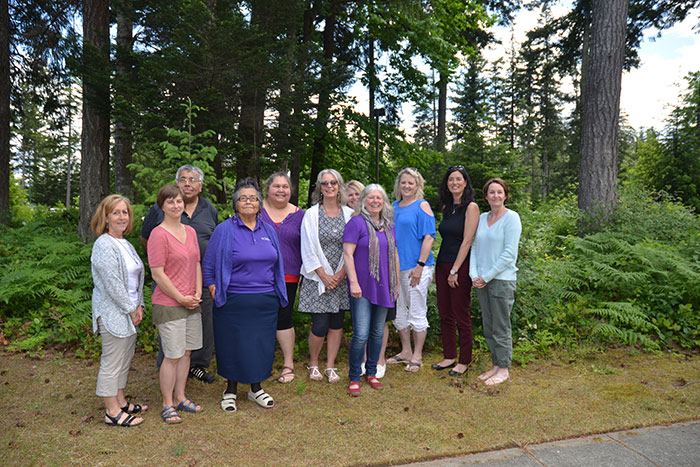NIC nursing instructor Joanna Fraser (centre) meets with the team assisting the research project, including representatives from the Kyuquot, Wuikinuxv and Dzawada̱ʼenux̱w First Nations.
An NIC nursing instructor is collaborating with remote First Nations communities to improve wellness, health services and understanding of Indigenous values in nursing education, thanks to a grant from the Social Sciences and Humanities Research Council (SSHRC).
Joanna Fraser’s research builds on the 10-year partnership between the college’s Bachelor of Science in Nursing (BSN) program and remote First Nations communities.
“This $212,067 grant expands our reconciliation work and transforms our curriculum,” said Fraser. “We are grateful to SSHRC for its support of this research.”
Under the guidance of Dr. Evelyn Voyageur, an NIC Elder-in-Residence and nurse, NIC’s BSN program is a recognized leader in responding to the challenges Indigenous people in remote communities face in accessing adequate, culturally effective health care services.
For the past 10 years, third and fourth-year nursing students have participated in practicums in First Nations communities on BC’s central coast and overseas.
This new funding introduces those experiences earlier in students’ studies.
Over two years, NIC faculty, Elders-in-Residence and nursing students will work with community mentors to create more immersion opportunities in First Nations communities.
“Fostering the relationship between nursing students and First Nations communities will help address the communities’ need to recruit and retain culturally effective nurses,” said Fraser. “Another benefit, identified by the Indigenous communities, is improved trust in the health care system and nurses, leading to improved access to health care services for community members.”
To learn more about NIC’s BSN program, visit www.nic.bc.ca/health-human-services.
Download High Res Images Media Contact C: 250-207-6946 media@nic.bc.ca